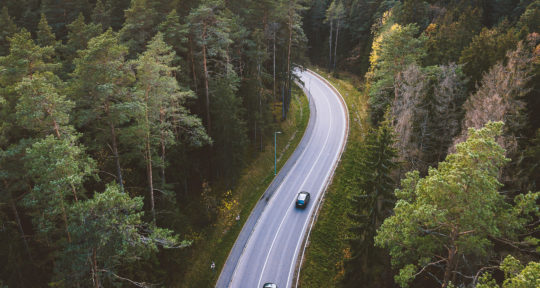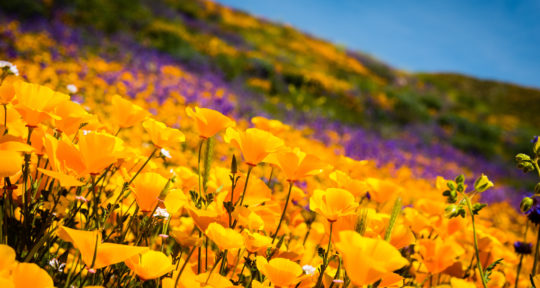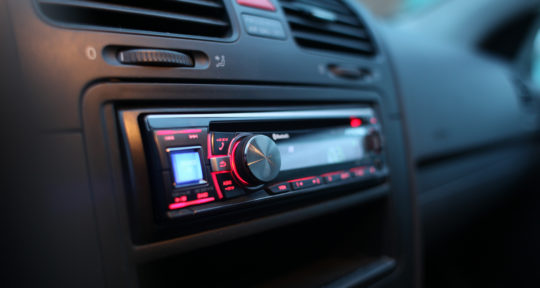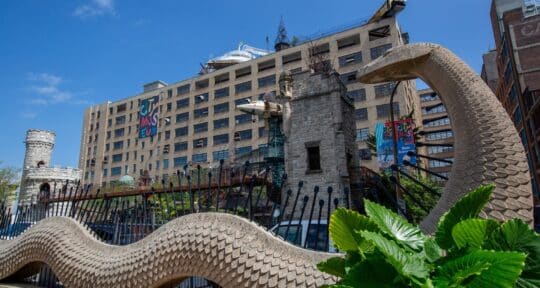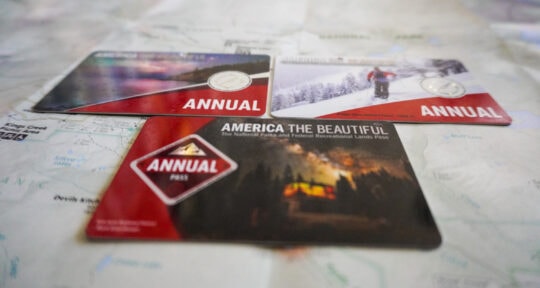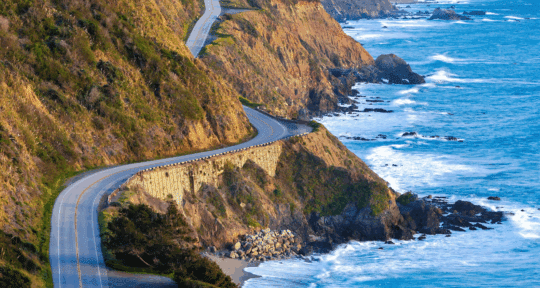There’s only one thing cooler than living in a van, and that’s living in a bus. A tricked-out former prison bus, to be specific. That’s exactly how Ben and Meagan Poirier from The Wild Drive have been rolling for the past couple of years.
Besides fixing up their gorgeous bus, they’re also incredibly passionate about living their best lives, and inspiring others to do the same. From discovering that anyone can learn to convert a bus with a little determination to tackling some major hiking challenges (accompanied by an adorable dog, of course), nothing can keep this couple down! Here’s their vanlife story.
Where do you eat most of your meals?
Meagan: We eat 95% of our meals in the bus. Making your own meals from scratch is a great way to save money and maintain a healthy lifestyle. Developing a routine and key go-to recipes makes life a lot easier and more consistent health-wise, which is a major priority for us.
What was life like before you lived on the road? What inspired you to make the change?
Life before the road in our bus was simpler and more routine, in many ways. We worked really hard, we saved, we hiked. Repeat. Ben and I lived in southern Maine, where we rented a great apartment from the owners of a campground I used to do marketing for. It was incredibly affordable. This lifestyle choice post-college was a key reason why we were able to pay off 100K of student loan and vehicle debt in less than four years.
Ben and I both had full-time jobs; he was the General Manager of a reclaimed lumber company, I was the Marketing & Member Relations Manager at the Old Orchard Beach Chamber of Commerce. I also freelanced in web and graphic design on the side. Our free time was spent building the bus and enjoying time outdoors. We’re big hikers, runners, and cyclists.
We were inspired to make a change for the reason of change itself; to encourage personal growth and face new challenges. Ben and I never took a semester off or traveled abroad, went back to school, or really took the time to ask ourselves, “What do you really want to do/see/be?” We had to work. Neither of us had a safety net to lean on so we committed the time and work necessary to create one for ourselves. This is our year to dig deep. What we’ve learned so far about ourselves, our relationship, our sources of gratitude, motivation, and confidence are so valuable. I never expected it.
Tell us about your ride. How old is it? How long have you had it? Did you do any work on it? What do you wish was different about it?
Our bus is a 1989 Chevy B6P 8.2T with a Detroit Diesel engine, nicknamed “the fuel pincher.” It’s a 3/4 bus, 31 feet long. It was first used as a prison bus, then converted into a mobile command center by the sheriff’s department in Fairfax, VA. It has very low miles and was incredibly well cared for. When we bought it it had a Cummins Onan generator and shore power already set up, three locking prison cages, server stands and two long fold-down tables, a few bus seats, and a 20-foot telescoping antenna mounted on the back. We would love to know more about its past life.
We bought it in February 2016 from an eccentric mechanic/collector/builder from Massachusetts. He planned to convert the bus himself but when he brought it home to his wife, she said he had way too many projects going already.
Ben and I (mostly Ben after the demolition phase, let’s be honest…) converted the entire bus into what you see now ourselves. We designed and built everything custom on the weekends, piece by piece while still working full-time. We even painted it ourselves, which saved us thousands of dollars.
It was essential for us to be off-grid and we’re so happy we set up those systems. Ben had minimal prior building experience but is a rock star researcher and tinkerer. He watched a ton of YouTube videos and weeded through forum message boards to find the information he needed.
We’ve been living in the bus now for five months full-time. Ben wishes that our engine had more power and torque. I wish that I still had a full-size oven and huge kitchen.
Other than the ride, what other preparations did you need to make to transition to living on the road?
We prepared financially by paying off all our debt and saving up a little nest egg to give us more time to explore what our next phase would be. Throughout debt payoff, we adapted to a very D.I.Y., low-overhead lifestyle, so our expenses were minimal to begin with. We created a free Finance Guide on our website with more information on how we paid off our debt and save money.
My freelance marketing business has helped us tremendously as we develop other plans. Having the ability to work remotely anytime and anywhere is one great way to make a mobile lifestyle work comfortably.
We also had to downsize our possessions significantly, which was a lot more time consuming than we thought. It’s so easy to develop attachments to things! Our motto is, if you don’t use it, and I mean often, then sell it or give it to someone who will.
Where are you now? Where are you headed next? How do you decide where to go?
We’re in the New Hampshire White Mountains for the summer. This is where Ben and I met, and it’s the best playground that two hiking-obsessed people and a dog could ask for. We’re currently finishing the bus and training for a couple of major long-distance hiking goals of ours.
First is a “White Mountains Challenge” where we’ll attempt to summit all 48 4,000-footers in New Hampshire in an unassisted thru-hike. It’s about 240 miles. We’ll take a short break and move on to complete the Cohos Trail which starts near us in NH and travels all the way to the Canadian border. Moose, our dog, hikes with us. He’s way better at it than we are.
Our next move is still in the works, to be honest. We started public speaking (with our bus!) regarding our debt-free journey and balancing physical, mental, and financial health when designing your young adult life post high-school.
We love sharing our energy with students and teachers and starting a conversation about responsible dream-seeking. We would love to continue doing that this fall across the northern states, paired with some hiking and exploring. We would also really like to write a couple of e-books.
Our visions and ideas change often and our plans evolve daily. It’s both exciting and challenging.
What’s the hardest part about living in a van? What have been some unexpected challenges?
We both agree that one difficult aspect is being somewhat restricted by the weather and elements. When you live in a small space, you feel it. We spent two months in the lingering New England winter and it was a much different experience than having all the windows open in the southwest sun.
When it’s warm, the outdoors are an extension of your living space. You have options. When it’s freezing rain and the wind is blowing, well, you have to hunker down. I suppose that’s all part of the experience and it makes you appreciate the fair weather that much more. It inspires us to make the most of whatever is going on outside.
Where do you eat most of your meals?
We eat 95% of our meals in the bus. Making your own meals from scratch is a great way to save money and maintain a healthy lifestyle. Developing a routine and key go-to recipes makes life a lot easier and more consistent health-wise, which is a major priority for us.
Where do you find Wifi?
When we’re on the road, finding Wi-Fi can be a little challenging. We use a mobile hot spot often for work purposes. A lot of truck stops, cafés, and rest areas offer free or low-cost Wi-Fi. If we’re out on BLM land, enjoying our time and boondocking, we don’t care all that much how strong our cell service is.
How do you shower?
The shower in our bus is still in the works (should be finished next week!) so for the time being, we do a combination of other things. While on the road, we take solar showers, stay at a state park once a week or so, etc. We currently have a gym membership here in NH which accomplishes our training goals and gives us a spot to shower.
Where do you park your bus for the night? What kinds of places do you like to stay at?
Where we stay depends where we are in the U.S. Out west, we love staying on Bureau of Land Management (BLM) land. In the east, we stay with friends or family because free camping and public land options aren’t really here for RVs. En route to places, we stay at a lot of rest areas (which are probably our favorite, super easy option) or truck stops if they’re RV friendly.
What lessons have you learned that you would pass on to those aspiring to live on the road?
A mobile source of income, or some sort of income plan via seasonal work, is pretty essential for your sanity and enjoyment. If you’re not generating some income, you’re only spending, and that isn’t sustainable. You want to enjoy what you’re doing and be able to say yes to opportunities.
We find this lifestyle is a balancing act between freedom and stability. It’s ideal to have both. We’re still shaping that equation to best fit our goals and yours might be different. It’s all about finding what elements you need to live the lifestyle you want.
We’ve also learned the growth that’s possible if you just trust yourself and try things. Our bus is this amazing source of positivity and challenge. We had no idea that we would be able to connect in unique ways with people from all over the world, in different age groups and demographics.
We started this just looking for a simple means by which to live our own way and maintain our debt-free lifestyle, but we’re getting so much more out of the experience. I won’t lie, some days we contemplate blowing the bus up out of frustration, but most days it’s pretty wonderful.
Wanna learn about how Ben and Meagan made their van life dream come true? Get the scoop on their website, thewilddrive.com, and follow them on Instagram: @wilddrivelife!
